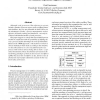Free Online Productivity Tools
i2Speak
i2Symbol
i2OCR
iTex2Img
iWeb2Print
iWeb2Shot
i2Type
iPdf2Split
iPdf2Merge
i2Bopomofo
i2Arabic
i2Style
i2Image
i2PDF
iLatex2Rtf
Sci2ools
135
click to vote
WETICE
1998
IEEE
1998
IEEE
Flexible Handling of Work Processes by Situation-Dependent Support Strategies
Although work pr ocesses, like software pr ocesses, include a number of process aspects such as defined phases and deadlines, they are not plannable in detail. Howe ver, the advantages of today's process management, such as effective document routing and timeliness, can only be achieved with detailed models of work processes. This paper suggests a concept that uses detailed process models in conjunction with the possibility of defining the way a process model determines the work of individuals. Based on the WAM approach1 , which allows workers to choose methods for their tasks according to the situation, we describe features to carry out planned parts of a process with workers always being able to start e xceptional mechanisms. These mechanisms are based on the g paradigm of link ed abstraction workflows (LAWs) that describe workflows at dif ferent le vels of ion and classify refinements of tasks by the way lower tasks can be used.
Detailed Process Models | Emerging Technology | Process Model | Today's Process Management | WETICE 1998 |
Related Content
| Added | 05 Aug 2010 |
| Updated | 05 Aug 2010 |
| Type | Conference |
| Year | 1998 |
| Where | WETICE |
| Authors | Gert Faustmann |
Comments (0)

